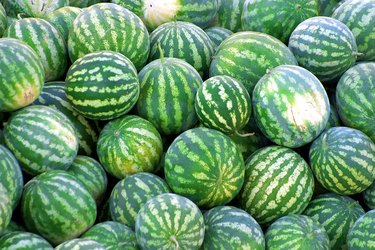 Seedless watermelons come from sterile triploid plants.
Seedless watermelons come from sterile triploid plants.
Although it sounds like something from a science-fiction novel, polyploidy is common in plants. Chromosomes typically appear in the cell in sets of two. However, sometimes when the cell divides, the daughter cells can end up with extra chromosomes or lacking one chromosome. The cells are called polyploid and monoploid, respectively. Modern agriculture makes use of polyploids, especially triploid plants.
Video of the Day
Triploidy Explained
A cell is called triploid when it has three complete sets of chromosomes, rather than the typical pair of chromosomes. Triploid plants are sterile, because chromosomes need to occur in pairs to produce viable offspring. The plant will still flower, but these flowers cannot be fertilized, because the gametes, or pollen and ovules, have a chromosomal number — three — that won\’t match up with the chromosomal number — two — of fertile gametes. The plants can still bear fruit, but the fruit is sterile, such as a seedless watermelon.
How It Occurs
Polyploidy naturally occurs often in plants and is a driving force of plant evolution. Triploid cells result during the cell division process called meiosis. In the first step, the pairs of chromosomes replicate themselves and line up to be split into daughter cells. Normally each daughter cell will receive one of the pairs. Occasionally, the chromosomes don\’t split properly, and one of the daughter cells receives three chromosomes while the other receives only one chromosome. While this process can cause severe genetic abnormalities in animals, plants with polyploid cells remain viable.
Making Polyploids
Agricultural scientists can force plants to develop as polyploids, with the aim that some of these will become triploid plants that will produce seedless fruits. During meiosis, the scientists introduce colchicine to the cellular environment. This chemical prevents the structures that pull the chromosome pairs apart into daughter cells from functioning. The result is daughter cells with extra chromosomes.
Uses of Triploids
Triploid plants bear flowers, but these flowers cannot be fertilized, because the odd numbers of chromosomes are unable to pair up properly. The plant can still be pollinated and will still bear fruit, but because no fertilization occurred, the fruit will not have seeds. When you purchase a seedless watermelon, you are purchasing the fruit of a triploid plant. Other triploid agricultural crops include bananas, Gravenstein apples and some grains.

